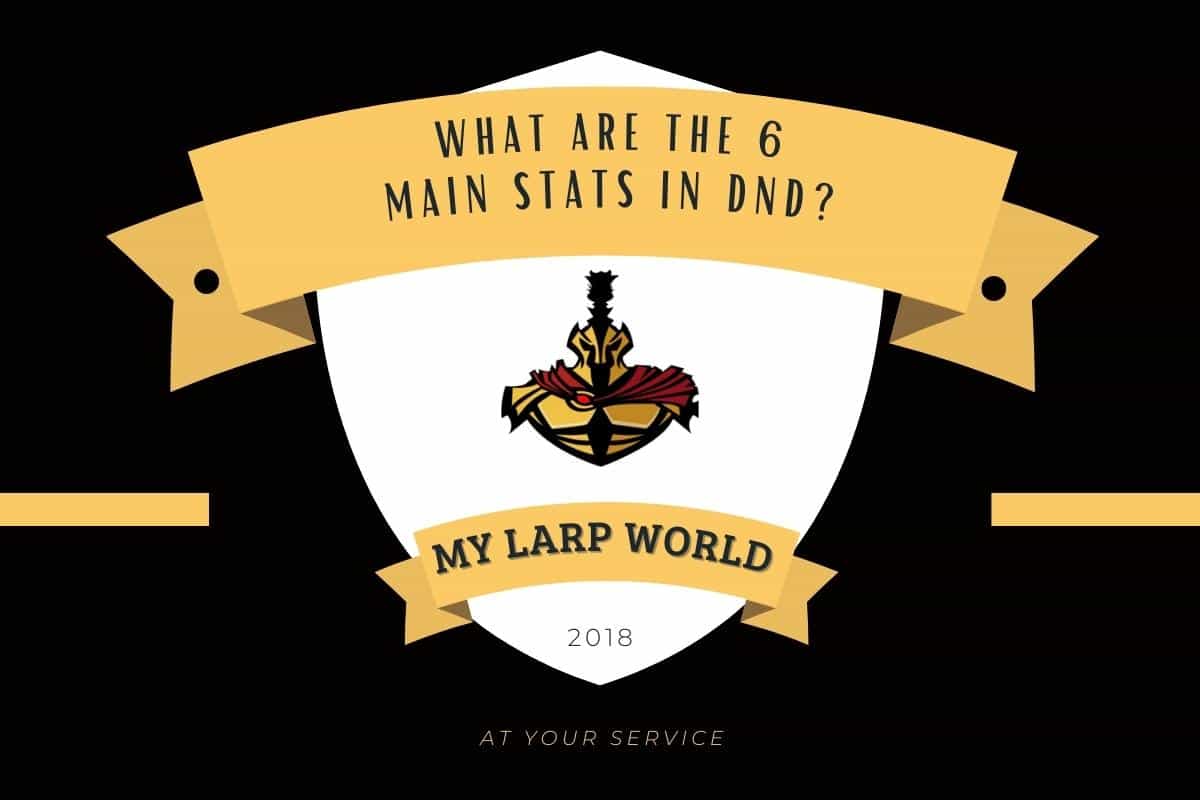Stats in DnD are ways to shape a character’s mental and physical abilities, and they can vary greatly. You first get introduced to stats in DnD when creating your character, after or before you have chosen a race, class, and background.
In this article, I’ll go through the various stats in DnD and their importance. So, what are the six different main stats in DnD?
The six main stats in DnD are Dexterity, Strength, Constitution, Intelligence, Charisma, and Wisdom. These six stats are meant to sum up the physical and mental abilities of any given character. In other words, each ability represents a different field of abilities that are separate from each other. These stats also modify the different rolls you perform throughout DnD games.
Let’s go through the six main stats in detail. What are they exactly, and how do they differ from each other? Read more to find out.
What Are the 6 Main Stats in DnD?

As I mentioned earlier, the six different main stats in DnD are Dexterity, Strength, Constitution, Intelligence, Charisma, and Wisdom. Let’s go through the stats in detail below to sort out the differences and importance of each stat.
In DnD, there’s something called ability checks. This can involve everything from lying to an NPC to performing an athletic feat. Depending on what it is, you use one of the six stats.
Every main stat has different skills connected to them, which ties into these ability checks. If your mission is to lie successfully to an NPC, you will perform an ability check for deception. This involves rolling a D20 and seeing if you can match the “difficulty class” of the situation.
Deception, in this example, is modified by your skill in Charisma. So, to increase your chances of lying successfully to the NPC (depending on the difficulty of the task), you will require a higher stat in Charisma to perform it successfully.
Other things go into ability checks as well. The modifiers for ability checks can be summed up as “skill modifiers”, and the formula for doing an ability check goes as follows: Ability modifier (the Charisma example above) + proficiency bonus + other modifiers.
The main stats in DnD are also used to save you from different perils in the game. All the different classes get two different saving throws that they can do well, in other words, be proficient in.
For example, a Wizard has proficiency in saving throws for Wisdom and Intelligence, while Barbarians have proficiency in Strength and Constitution. If the Wizard rolls a saving throw for Intelligence, his points in the Intelligence core stat will give him a certain bonus to that saving throw.
Why is this all of this relevant? Because all of the different stats cover different skills, which will be listed below, and just listing them would probably confuse some, without the context of how the skills are practically connected to the stats.
Dexterity
Let’s start with dexterity. Dexterity represents how agile a character is. Moreover, if you wear light armor, you would use your dexterity modifier to help determine your armor class.
The base classes that use dexterity as one of their saving throw proficiencies are the Bard, Ranger, Rogue, and Monk. They all have one more saving throw proficiency as I mentioned earlier.
There are also skills associated with Dexterity (this goes for every stat), and they are the following:
- Acrobatics – This involves staying on your feet in disadvantageous situations. Examples of this are balancing on narrow surfaces, running over slippery ice, and more.
- Stealth – Stealth is the ability to sneak undetected. This includes passing guards without them detecting you, hiding from enemies, and more.
- Sleight of Hand – Sleight of Hand is the ability to use fine motor skills to perform various activities. This includes pickpocketing, disarming traps, and so forth.
There’s more to each stat, but this is the basic information that you need to know when starting out. Keep reading to find out more about the other stats of DnD.
Strength
Strength represents a character’s ability to exert physical force. Strength influences things such as the ability to shove, lift stuff, and grapple. Character’s with a high strength stat can also carry more stuff before they become over-encumbered.
The classes with saving proficiencies in Strength are the Barbarian, Monk, Fighter, and Ranger. Unlike many other stats, strength is only associated with one skill, which is Athletics. Athletics involve physically demanding activities such as climbing, swimming, and jumping.
Whereas dexterity is useful for characters that are nimble and use lighter weapons, characters with high strength can carry heavy weapons such as great axes.
Constitution
Constitution represents a character’s general health condition. A character with a high constitution score will be able to take more hits than most and survive diseases and other conditions.
The higher your constitution, the more maximum health points you have. This goes for every character in DnD, so it’s more of a universally important stat than other stats.
Intelligence
Intelligence represents a character’s, well, intelligence. Examples of this could be analyzing situations, their ability to memorize stuff, and reasoning. There are a bunch of skills connected to intelligence:
- Arcana – This isn’t a very intuitive skill for us mere humans, but arcana involves remembering facts about magic, for example, magical items, spells, magical history, and arcane symbols.
- History – With a skill in history, a character is able to recall the events of history. Lore, wars, towns, peoples, and much more.
- Investigation – The investigation skill involves being good at deducing information based on clues. DnD sometimes involves a lot of detective work, which makes this a useful skill.
- Nature – The Nature skill in DnD is being able to recall information about plants, animals, the weather, and a lot more.
- Religion – The Religion skill in DnD involves recalling information about religions, religious practices, symbols, and documents.
The classes that have proficiencies in Intelligence saving throws are the Wizard, Rogue, Artificer, and Druid.
Charisma
Charisma represents a character’s social ability. This means charm, the ability to express yourself, and self-confidence. This skill is useful in a lot of dialogue situations as you might imagine.
The skills connected with charisma are the following:
- Deception – The ability to deceive people for your gain. This can involve hiding the ugly truth or purveying a practical untruth.
- Intimidation – Intimidation is the ability to force your will by threat of violence or other consequences.
- Performance – Performance is a character’s ability to charm an audience. This can involve various activities, such as singing, dancing, telling a story, and more.
- Persuasion – Persuasion is the ability to convince other characters of what you’re saying. This is different from intimidation, as you’re not threatening people but rather convincing them through tactfulness and social skills.
The classes that have proficiencies in Charisma saving throws are the Bard, Cleric, Paladin, Sorcerer, and Warlock.
Wisdom
Wisdom represents a character’s ability to have common sense, good perception, and strong intuition. It’s different from Intelligence. Wisdom is generally about what something means, while Intelligence generally is about what something is.
If you think that distinction was somewhat ambiguous, let’s go over the skills for Wisdom and see if it clears up.
- Animal Handling – Animal handling is about connecting with animals. In a practical sense, this can be helpful to calm animals down, identify and predict behaviors of wild animals, and more.
- Insight – Insight is the ability to determine intentions, motives, and moods. This can for example be helpful if someone is telling a lie.
- Medicine – The medicine skill can be used to diagnose diseases and furthermore stabilize dying characters.
- Perception – Perception is used to spot things that are hard to notice. For example, this could be traps, secret doors, spot perils, and so forth.
- Survival – The survival skill is useful for tracking and navigating routes, among other things.
The classes that have proficiencies in Wisdom saving throws are the Cleric, Warlock, Sorcerer, and Paladin.
What is the Best Stat in DnD?
All stats in DnD have some purpose, but some are more busted than others. So, what is considered to be the best stat in DnD?
Dexterity is generally considered to be one of the stronger stats in DnD. Why is this? It provides many benefits such as Stealth and SoH, and at the same time gives you damage and a modifier to most armor classes.
Moreover, dex saves are used for a lot of saving throws. To sum up, dexterity is a very good all-around stat, giving armor, damage, good saves, and more.
While Dexterity is a very good stat in DnD, there are of course situations where a stat like Charisma is needed and Dexterity might be useless. What stat is the best depends a lot on the situation, that’s for sure.

